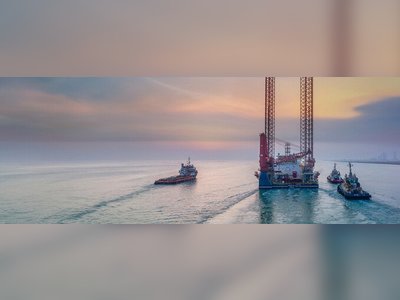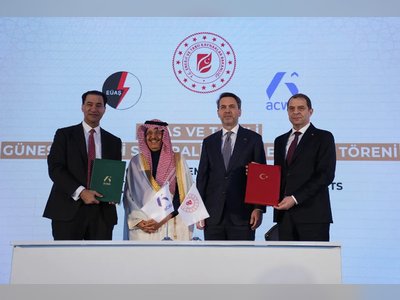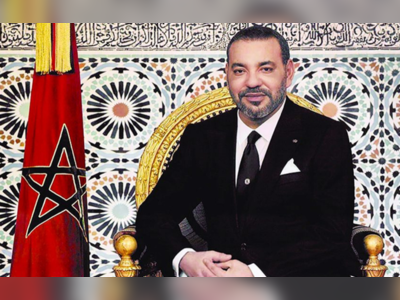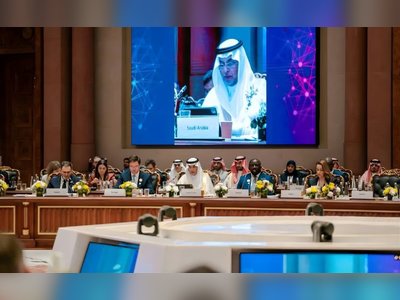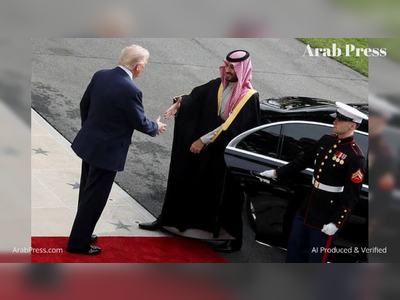
Ahmadinejad urges Biden to 'use his chance' to repair Iran relations
Iran heads to the polls this week in a pivotal moment for the country - domestically and internationally.
And our guest on the Global Conversation is Iran's former president, Mahmoud Ahmadinejad.
ANELISE BORGES: Can I start by asking your reaction to the Guardian Council’s decision to prevent you from running? And your opinion on what the selection of candidates says about Iran today?
MAHMOUD AHMADINEJAD: Firstly, let me say hello to you and your co-workers. And to those who will watch, listen to, or read this program. People had invited me to be a candidate this time. Large groups of people from all around the country insisted that I became a candidate and I accepted it. But without any special reason, I was removed. Today I feel a responsibility to support people’s interests and reform the mechanism that caused the will of a majority of the people to be left out.
ANELISE BORGES: You have already had your go at this. Why did you want to be president again? What do you think your country needs right now that you would be the best fit to deliver?
MAHMOUD AHMADINEJAD: As I mentioned, this time people asked me to be a candidate. Millions of people from around the country came to my home and participated in gatherings; sent letters and messages; insisted that I enter the race. And so, to answer the people’s will I joined. But I think Iran, like other parts of the world, needs fundamental reforms – so does the United States of America, South America, Europe, Africa and Asia. All countries need fundamental changes to fulfil people’s rights. Iran, like those countries, also needs fundamental changes. And I will always try to go in this direction.
ANELISE BORGES: Can I ask you more details about those reforms? What exactly would you have put in place had you been given the chance to run for office?
MAHMOUD AHMADINEJAD: The sovereignty belongs to the people. And the principle is that people should be completely free in determining their destiny and their lifestyle.
Nowadays, because people have been deprived of their rights, we witness widespread poverty, widening inequality, domination, war and disputes between nations. The arms race is an insult to human beings. I think this situation must change. God has created all human beings from the same principle. Our God is the same. We can talk to him in every language. We are all from the same family. We must live together. Human beings have been created for friendship, cooperation and love. They have not been created for animosity and fighting and to plunder the wealth of others. The state of the world doesn't look like it's guided by the principles of humanity. I think we must have fundamental changes in the world.
ANELISE BORGES: How do you see the outgoing administration? Do you think they have achieved something positive these past 8 years?
MAHMOUD AHMADINEJAD: We must ask this question to the people. The polls show that the majority of people are dissatisfied with the performance of the government over the past eight years.
ANELISE BORGES: As we speak, one of the biggest legacies of the Rouhani administration is once again being negotiated: I am talking about the JCPOA. Do you think that negotiations should continue around the nuclear deal?
MAHMOUD AHMADINEJAD: I believe the current administration is a long way from reaching a conclusion. If the JCPOA was to continue in its previous framework, it would fail in advance. In every agreement, the balance between commitments and responsibilities must be observed by both sides. We don’t see this in the JCPOA. That’s why it didn’t solve our issues. It has complicated the situation and made it more difficult to solve. The JCPOA must follow international law, justice and feature mutual respect.
ANELISE BORGES: You speak about mutual respect; you also spoke about peace and progress; those were the objectives of the deal.
MAHMOUD AHMADINEJAD: It’s not like that. Let me give you an example. In every agreement, there's a section designed to resolve disputes. But here, six countries are against Iran’s peaceful nuclear program. Under the JCPOA, dispute resolution must involve a council of seven countries. Each country has one vote, and each subject needs seven votes to be approved. That means that Iranian people’s rights will never be enforced in the treaty. It is against international laws and rights. When there is no balance, no agreement can be fruitful. Mr. Trump withdrew from the treaty unilaterally and the other countries couldn’t prevent him or continue with the rest of the treaty.
ANELISE BORGES: Do you feel as though the European Union has failed Iran when it comes to these negotiations – when it comes to bringing the US back to the deal?
MAHMOUD AHMADINEJAD: Let me tell you… We have a wish, but we don’t know whether it is achievable. We would like the EU to step out of the US’s shadow. Europe could have good relations with Iran. And so could the US. I believe cooperation is the main principle. The mechanisms of the last hundred years can no longer be maintained: I mean the framework in which some countries are superior to others. That period is over. We should talk and cooperate as equals, with justice and mutual respect. No country should infringe on another's rights. This would be beneficial for all countries. I tell you that the world's condition is changing rapidly. Colonialism has reached its final steps. The tendency to believe some countries are superior to other countries is coming to an end. It is against humanity. We must move toward friendship, understanding, and equal rights. We must manage the world all together. The lack of balance between nations causes wars, arms races, social divisions and animosity. It causes nations to be apart from each other. I believe that we must work together. We must be friends with equal rights. We are all human beings. Why are there differences between peoples? We like to have friendly and respectful relations with everyone, such as Europe and America. Relations based on justice. Superpowers have never been able to ensure the well-being of the people.
ANELISE BORGES: You talk about managing the world in peace, and finding peaceful solutions. This is no easy task. Especially with regards to how fast politics are changing right now and the dynamics of the region but also the wider world. The US now has a new administration. Do you think that there is hope for a renewal of relations between the US and Iran now that Joe Biden is president?
MAHMOUD AHMADINEJAD: Definitely there is a way, but the condition is that we recognize each other's rights. We must respect justice and mutual respect. Confrontation between countries is useless. People are the ones who lose. Only capitalist groups benefit.
So yes, it is possible. But Mr Biden must show that US policy has changed in a concrete way. As far as I know, US foreign policy is being determined by powerful people behind the scenes, and US presidents don’t have as much power as we are made to believe. I hope fundamental changes happen there. We would welcome that change - and I think all nations would welcome fundamental change in US foreign policy. I remember when Mr Obama was a candidate, he promised to change these policies several times and nations welcomed that. But unfortunately, he didn’t fulfil his promise and he missed the opportunity. I hope Mr Biden uses this chance. I believe the educated elites of both countries will get together and solve the issues.
ANELISE BORGES: The entire world will be watching when votes are counted at the end of the week. What is your message to the rest of the world with regards to Iran’s ambitions in the future?
MAHMOUD AHMADINEJAD: I think they should look at the Iranian people. They should respect other nation’s rights. Iran has a great people. Iran has history, culture and civilization. Iran will overcome the problems it currently faces. No one should count on Iran’s temporary problems in order to impose an issue on Iran or violate its rights. They should pay attention to Iranians’ capabilities. In the future, nations will live together and manage the world together.
ANELISE BORGES: I have one final question. Will you vote on Friday?
MAHMOUD AHMADINEJAD: I have announced that I will not vote if there is no change in the Guardian Council’s decision. Nor will I support anyone.


